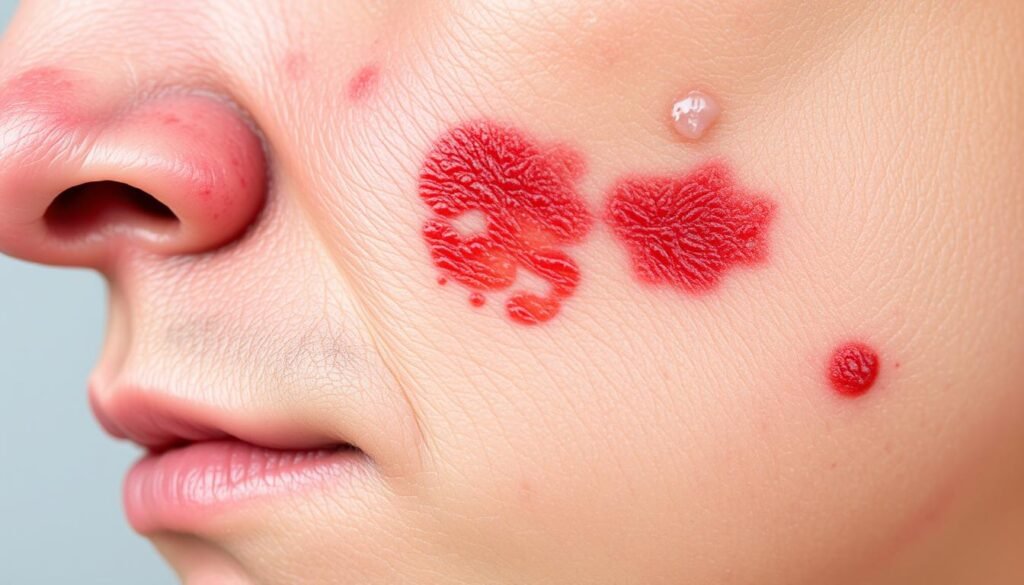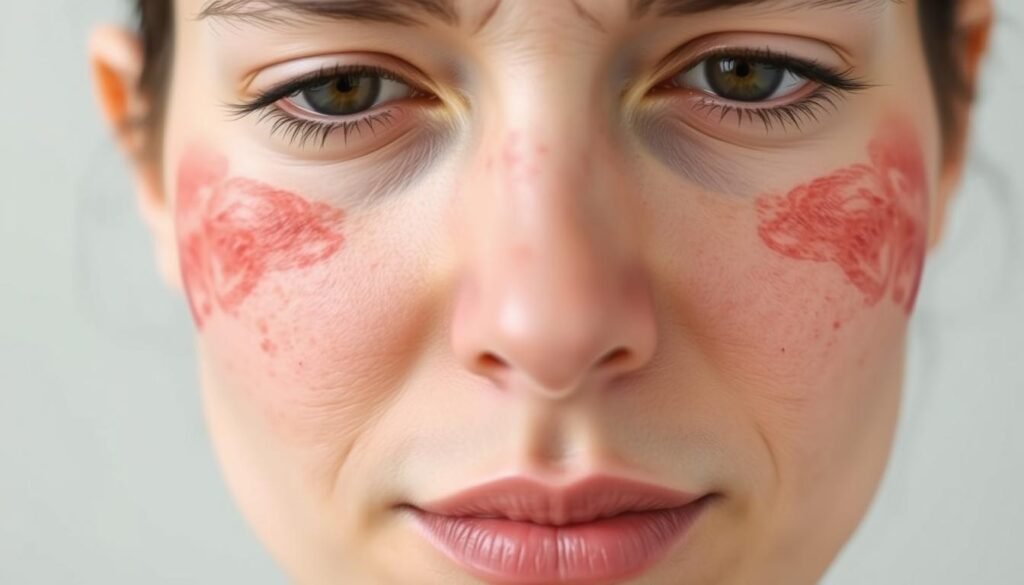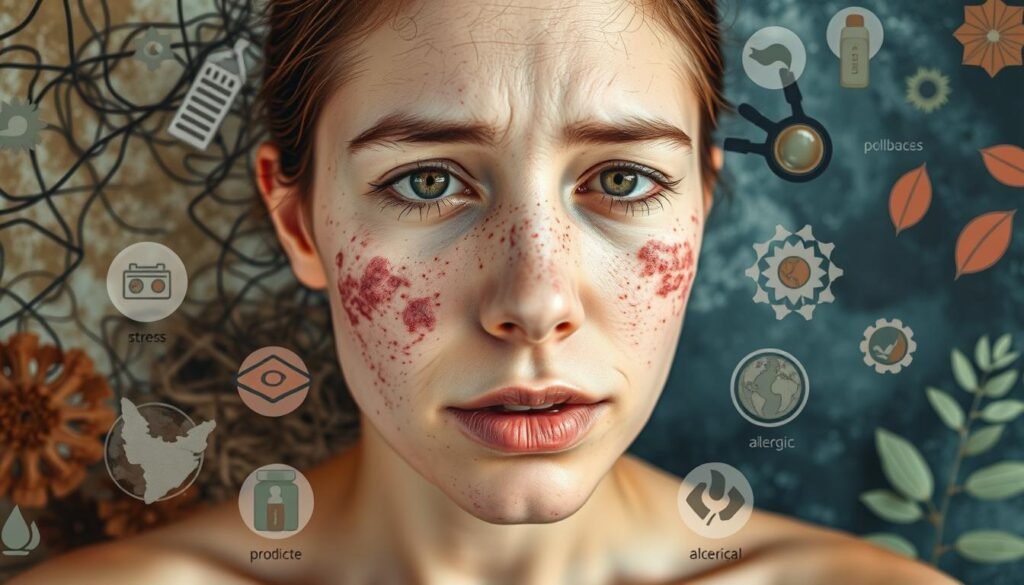Over 31 million Americans have eczema, making it very common. Stress causes flare-ups for many, as shown in a 2020 survey. In it, 57% of women and 41% of men said stress worsens their eczema. This shows how stress affects our skin, especially sensitive areas like the face.
Eczema is a long-term skin issue that causes itching and redness. It makes life harder for those with it. We’ll look into why stress affects eczema on the face. It’s about how stress stops the skin from healing and increases redness.
Key Takeaways
- Stress triggers eczema in many, especially women and men.
- Eczema leads to skin redness and itching, causing discomfort.
- Knowing how stress impacts eczema helps in managing it.
- Being resilient helps deal with eczema’s mental and physical problems.
- Managing stress well can reduce stress-related eczema effects.
- Long-term stress affects eczema more than short-term stress does.
The Prevalence of Eczema in the United States
Eczema, especially atopic dermatitis, is a major health issue in the United States. It affects many people, no matter their age or background. Knowing more about it helps us understand why it’s important to be aware and have good care strategies.
Understanding Eczema as a Common Skin Condition
About 31.6 million Americans, or 10.1% of the population, deal with eczema. Children see it more, with 15% to 30% affected during their lifetime. For adults, it’s between 2% to 10%. Most cases, about 60%, start before a child turns one. Eczema ties closely with other conditions like asthma and allergic rhinitis, known as the “atopic march.”
Those with atopic dermatitis often suffer from these related issues. It shows how complex eczema can be.
Statistics on Eczema in American Adults
In the US, 16.5 million adults have atopic dermatitis, making up 7.3% of the adult population. Almost 40% of these face moderate to severe symptoms. Sleep problems also trouble one-third of adults with this condition. This situation affects their day-to-day lives significantly.
The numbers are rising, especially in kids, who have a higher risk of food allergies. Adults might end up with chronic issues like diabetes and heart disease. This invites us to look closer at the challenges eczema brings.
| Age Group | Prevalence of Eczema (%) | Severity |
|---|---|---|
| Children (under 18) | 15% – 30% | Moderate to Severe: 33% |
| Adults | 2% – 10% | Moderate to Severe: 40% |
What is Eczema and Its Forms?
Eczema is a group of conditions that cause chronic inflammation of the skin. Symptoms like dryness, itchiness, and rash are common. By knowing the different eczema types, people can handle this skin issue better. Eczema affects both children and adults, showing varied symptoms based on its form.
Defining Eczema: A Chronic Inflammatory Skin Disease
Eczema is a long-term skin problem that affects over 31 million Americans. It ranges from mildly annoying to extremely severe. Symptoms usually include dryness, itchiness, and rashes. These can disrupt daily life. Many people experience flare-ups and periods where symptoms lessen, which is why managing eczema is crucial.
Types of Eczema: Atopic Dermatitis and More
Atopic dermatitis is the most common type of eczema, impacting millions of children and adults in the U.S. Here’s a quick look at the major forms:
| Eczema Type | Characteristics | Common Age of Onset |
|---|---|---|
| Atopic Dermatitis | Itchy, inflamed skin; often linked to allergies | Childhood, can persist into adulthood |
| Dyshidrotic Eczema | Small blisters on fingers and palms; more common in men | Adolescence and adulthood |
| Contact Dermatitis | Caused by direct irritation or allergic reactions | Can develop at any age |
| Seborrhoeic Dermatitis | Greasy, scaly patches; common on the scalp (cradle cap) | Usually seen in infants and adults |
| Neurodermatitis | Thickened, scaly patches due to scratching | Typically develops in adulthood |
| Stasis Dermatitis | Red, swollen, itchy rash due to poor circulation | Often seen in older adults |
| Other Varieties | Include lip-licking dermatitis and various allergic contact forms | Can occur in different age groups |

Knowing the different eczema types helps in finding the right treatment. Both genetics and environment play a role in eczema. Understanding each type’s symptoms and causes improves management.
Understanding Stress Eczema on Face Causes
Many people worry about stress eczema on their face. It’s because stress affects our skin health. Knowing how these two are linked helps us deal with this skin issue better. Stress shows up in many ways, causing eczema to flare up or get worse.
The Medical Link Between Stress and Eczema Flare-Ups
Studies show a key link between stress and worse eczema. Stress triggers can make symptoms tougher to handle. With more stress, our bodies make cortisol. This hormone makes skin inflammation worse. Because of cortisol, healing becomes a hard task. This makes managing stress eczema tough.
Stress can also weaken our immune system and increase inflammation. This shows how closely mental health and skin problems are connected.
How Stress Hormones Affect Skin Health
Higher cortisol from stress affects our skin badly. This leads to harsher eczema symptoms and longer flare-ups. Stress is especially harmful for those already dealing with skin issues. For example, pairing psychological therapy with usual care can improve skin health.
High stress often causes sleep problems. Lack of sleep means our skin can’t heal well. This makes it harder to deal with stress eczema.

Controlling cortisol and using stress reduction techniques can help. Methods like mindfulness and exercise might lessen eczema outbreaks. Knowing what outside things and personal factors trigger stress can help create a good management plan. For tips on avoiding triggers, check out this helpful link.
The Impact of Stress on Skin Barrier Function
Learning how stress affects skin health is crucial, especially the skin barrier function. Stress raises cortisol levels, which greatly impacts skin inflammation. Such increases in cortisol can make dry skin symptoms worse. This causes more feelings of irritation and discomfort. Through understanding these processes, people can take care of their skin better. This is especially true for those facing conditions like eczema.
The Role of Cortisol in Skin Inflammation
Cortisol is known as the “stress hormone” and impacts much, including the skin. When we’re stressed, cortisol levels go up. This leads to inflammatory reactions in the skin. Such inflammation weakens the skin barrier function. It lets irritants in more easily and makes existing conditions worse. Being under stress for a long time can cause a lot of inflammation. This may make dry skin worse and cause eczema to flare up more often.
How Stress Weakens the Epidermal Barrier
The epidermal barrier is the skin’s defense against the environment. Stress weakens this barrier, making it more permeable to irritants. This weakening leads to more dryness, irritation, and inflammation. During stressful times, one might find their skin reacting more to pollutants or allergens. This makes dealing with dry skin and eczema even harder.
Identifying Common Triggers for Stress Eczema
Knowing what causes stress eczema is key to handling it. Things in our surroundings like allergens make it worse. This includes dust mites and metals, along with smoke from cigarettes. Knowing about these can help us avoid or reduce skin problems.
Environmental Factors Contributing to Eczema
Many things around us can make eczema worse. These include:
- Dust and dust mites
- Cigarette smoke
- Certain metals, such as nickel
- Fabric types like polyester or wool
- Weather changes
Food allergies also play a big role, especially for kids. Foods like milk, eggs, peanuts, and wheat are common triggers. Keeping skin moist helps. Exercise is good for stress but sweat can trigger eczema.
Emotional Stressors That Worsen Eczema Symptoms
Feeling stressed can make eczema worse. Anxiety and ongoing stress cause the skin to react. This includes issues from work, family, or not sleeping enough.
Stress messes with our immune system and can make skin conditions harder to handle. Techniques like deep breathing and yoga can help. Counseling or joining support groups can also make a big difference. To learn more about stress and eczema, check out this helpful resource.

Mental Health and Eczema: The Comorbidity Connection
The link between mental health and eczema is important. Studies show that dealing with eczema is harder for people with anxiety and depression. Eczema symptoms can worsen mental health, affecting everyday life.
The Relationship Between Anxiety, Depression, and Eczema
Studies show eczema increases the risk of anxiety and depression. Adults with it face a 14% higher risk of depression and 17% more anxiety. Treating both skin and mental health together is essential.
How Mental Health Conditions Affect Eczema Severity
The worse the eczema, the higher the anxiety and depression levels. Severe eczema sufferers have a 26% higher chance of depression. Anxiety also rises with eczema severity. It shows we must treat mental health to help with eczema.
Strategies for Managing Stress to Prevent Eczema Flare-Ups
It’s vital to see how stress links to eczema outbreaks. Knowing what stresses you each day helps you find specific ways to cope. Recognizing these stress triggers lets you make big changes. These can better your skin and your overall happiness.
Identifying Personal Stressors in Daily Life
Everyday challenges can make stress worse, which may worsen eczema. Work stress, family matters, and money worries are usual culprits. By figuring out which situations stress you out, you can tackle them head-on. Using methods like mindfulness can help a lot. Also, using eczema apps to track your symptoms can show you stress-related patterns.
Effective Lifestyle Changes to Lower Stress Levels
Making positive changes in how you live can really help control stress. This lowers the chances of eczema getting worse. Think about trying these strategies:
- Regular Exercise: Working out releases endorphins, easing stress.
- Adequate Sleep: Good sleep keeps your mood steady and lowers crankiness.
- Balanced Diet: Healthy eating boosts your health and may help with eczema.
- Social Support: Good friends offer emotional support, helping you manage stress better.
- Cognitive Behavioral Therapy (CBT): This method is about controlling stress and can improve eczema.
As the National Eczema Association notes, these steps are key in avoiding eczema flares and improving skin care. Managing stress well means you’re more likely to have healthier skin and a better life quality.
Coping Mechanisms for Eczema Sufferers
Living with eczema affects your emotional health. Finding good ways to cope is crucial for skin and mental health. Joining support groups and relaxing can really help your recovery and life quality. Knowing these strategies provides relief and makes you stronger against eczema’s challenges.
The Importance of Social Support Networks
Having strong support is key for eczema patients. It offers emotional help and practical support. When you connect with friends, family, and groups, you feel less alone. These connections lower anxiety and depression from eczema. Talking with others who get it builds community and boosts your well-being.
Relaxation Techniques and Mental Health Support
Relaxation methods help deal with eczema stress. Mindfulness, meditation, and deep breathing lessen anxiety and support mental health. Do things you love to distract from eczema stress. Understanding how stress and eczema connect is important. Less stress means better skin health.
Conclusion
Knowing why stress eczema appears on the face is key for managing it well. Stress doesn’t cause eczema directly, but it can make it worse. Tackling both stress and skin health together is crucial for people with this ongoing issue.
Making life changes to lessen stress can improve eczema treatment. Adding relaxation methods and getting professional help can also boost one’s well-being. Studies show that getting psychological support can make treatments up to 30% more effective.
Joining Therapeutic Patient Education (TPE) workshops is beneficial. It helps people learn how to better care for themselves. They learn to deal with their condition more effectively.
Understanding all the factors that trigger eczema is important. This includes irritants, allergens, and stress. A complete approach that looks at both the body and mind can help. This way, those affected can manage their eczema better and improve their life quality. For more details about how stress affects skin diseases, check out this article.